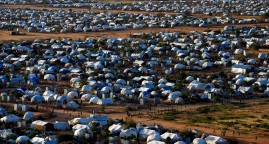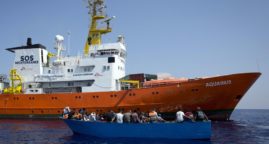The European message to refugees
While NGOs like MSF criticize the Europe Agreement with Turkey, Professor Vincent Chetail evokes the risk of a new Calais in Greece
By signing an agreement with Turkey for shielding its external borders, has the European Union (EU) disowned its principles in an attempt to preserve its unity? Officially, according to Brussels, the goal is to “break the economic model” smugglers who supply illegal migration between the Turkish and Greek coast. The measures to achieve this fit into compliance with international and European law, insists the European Commission. The High Commissioner for Refugees (UNHCR), which found nothing wrong at first, now expresses its “concern” and specifies not to be associated with this approach. In fact, haggling with Ankara to stop the flow of refugees might be inapplicable for practical and legal reasons.
All the possible means
Under the terms of the agreement, the Turkish and Greek border guards will take the necessary measures to prevent “irregular migrants” to reach European shores. But it is specified, there will be no automatic or collective dismissal, each claim will be considered on an individual basis. As a reminder, any applicant for asylum has a right to two levels of appeal in case of refusal of the application, one administrative and the other legal, says the European Court of Human Rights.
“It’s a contradiction, said Vincent Chetail, director of global migration Centre in the Graduate Institute of International and Development Studies (Graduate Institute). On the one hand, we say that all irregular migrants will be returned and on the other that we will conduct an individual review. How Greece could do this while it’s been years that she has been unable to? “The EU response? 4000 people will strengthen the Greek system: a thousand security officers or soldiers; 1800 police officers; 600 experts asylum; 400 translators; sixty lawyers. It will cost 280 million euros for the next six months, a bill paid by Brussels.
The asylum issue
The Greek authorities have started the transfer to the Greek mainland 8,000 migrants arrived on their islands before March 20, the date of the entry into force of the Agreement. But the flow has not dried up. For example, UNHCR reported the arrival of 934 new migrants on the island of Lesbos. They were immediately directed to the “hotspot” of Moria, these reception and sorting camps that are now in the eyes of the international organization, a simple “detention center”. Why? Because all the migrants are actually intended to return once treated their request, even after use.
Their request will indeed be denied in the name of two principles of the European Directive on asylum procedures: an applicant can be deported to a country where it has already been recognized as a refugee on the one hand, or to a “safe third country”, on the other hand. This is one of the tricks of the agreement: Turkey has recently considered by Greece as a safe country. Ankara accepted this arrangement in exchange for aid of EUR 6 billion for the reception of refugees and other benefits (European visas and revival of the EU accession process). According to UNHCR, Doctors Without Borders announced Wednesday its refusal to continue working in Moria. “That would make us accomplices of a system that we consider both unjust and inhumane,” said Marie Elisabeth Ingres, head of mission of NGOs in Greece.
Formally, the EU respects the principle of non-refoulement enshrined in the Geneva Convention of 1951 stipulates that refugees who rejected asylum applicant can be returned to a country where they risk ill-treatment, torture or execution. Can we consider Turkey as a safe country? “I do not think so and that’s where the risk of falling European pitch since the conditions required by the Directive asylum procedure to be considered a safe country are not met,” Judge Vincent Chetail.
Ankara has ratified the Geneva Convention with reservations. Protection of refugees is limited to Europeans and, since 2014, the Syrians. What, for example, Syrian Kurds while a war is under way between the Turkish government and the Kurds? And what about the other nationalities, Iraqis and Afghans in the lead, which Ankara does not recognize the right to shelter?
The EU is also committed to host a Syrian refugee established in Turkey in exchange for each Syrian migrant returned to Turkey. This is another innovation of the agreement, the principle 1: 1. “It is discriminatory because only one nationality is concerned, continues Vincent Chetail. It is a violation of Article 3 of the Geneva Convention and the stipulated equal treatment principle by both the European treaties and international. ”
The message in question
The agreement with Turkey, the result of an inglorious haggling but that can judge politically necessary at a time when anti-immigrant populist parties gaining votes election after election across Europe, should it not therefore be understood primarily as a message? This is not its strict application that counts, but the signal given to both candidates for EU asylum, to reduce the number, and European populations, to show them that the EU acts.
This calculation is the EU action engine that is bound to make a pact with a country, Turkey, which operates an authoritarian and repressive turn. Not only the agreement of 18 March is problematic in legal terms, it is difficult to defend ethically. “The fundamental problem, says Vincent Chetail is that the EU treats refugees like cattle.” The failure of Europe’s asylum policy is broader reflection of the bankruptcy of its migration policy and the Dublin system. Instead of a refugee crisis, we should speak of a humanitarian crisis. “The risk is to transform Greece into a huge Calais, a sort of open-air prison”, says the researcher.
Furthermore, assuming that the lock works in Greece and Turkey agrees to police its borders, the migration flow will take other paths with Libya as the starting port. The number of victims at sea would then increase significantly. Once the border with Turkey again under control, promises Brussels, a humanitarian admission program on a voluntary basis will be “activated”. What are we talking about? This is a distribution of asylum applicants from refugee camps. This involves not only European solidarity but international. “This is the solution advocated for years by most experts of migration,” says Vincent Chetail. It is for this purpose that Filippo Grandi, the new High Commissioner for Refugees, convened in Geneva on 30 March an international conference on the distribution of Syrian refugees.
Europe in question
Today, some voices denounce a German-Turkish agreement imposed on Europe by Angela Merkel to save the end of his reign when it is increasingly contested because of its generous refugee policy. A bad trial. If that is the German chancellor who is once again the maneuver, it only underscores just over the bankruptcy of the political elites of other major European countries. Berlin was the only capital city with Stockholm, consistently apply the principle of protection displayed by the EU.
The tension of Europeans to the arrival of Middle East refugees can not be explained by the single question of numbers. In 2015, the EU registered 1.2 million applications for asylum, according to Eurostat. Assuming that they all accepted, this would represent 0.2% of the total population while at the same time a quarter of Lebanon’s population consists of refugees. The Muslim origin of a majority of the current asylum seekers, in full wave of terrorist attacks justified in the name of Islam, nourishes discomfort. “We must regain his composure, out of the emergency, there is no invasion, said Vincent Chetail. By focusing on migrants, the political and media world is playing a dangerous game of democracy. ”
Translate from the french.
Read the full article in french on Le Temps website
Related Articles
UN refugee chief: funding shortage triggered Europe arrivals
11/03/2015. The combined resources are no longer enough to protect the 60 million people displaced by war and persecution.
We must harness the true strength of migration
2015. The view of Special Representative of the UN Secretary General for Migration.
Migrants from Libya not driven by hope of being rescued at sea – study
11/19/2019. No valid statistical link exists between the likelihood that migrants will be rescued at sea and the number of attempted Mediterranean crossings, a study has found.






